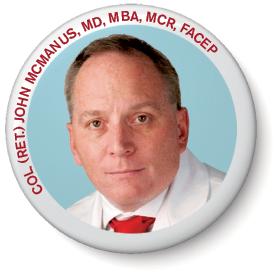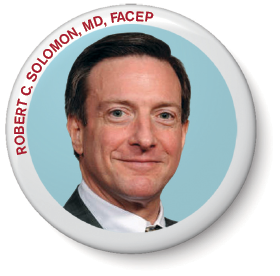
It has been said, “Everything needs to be said, just not by everybody.” The Speaker should help each person find their voice so all comments add value while strengthening reference committees’ focus on consensus building. Through this approach, an efficient and vetted consent calendar would free time to debate more controversial topics, removing the rushed pressure to close debate prematurely.
Explore This Issue
ACEP Now: Vol 34 – No 10 – October 2015The diversity of our Council can create rich solutions. The Vice Speaker must assure people find their voice so we may enjoy progress and results. I can do that.
 Col. (ret.) John McManus, MD, MBA, MCR, FACEP (Georgia)
Col. (ret.) John McManus, MD, MBA, MCR, FACEP (Georgia)
Current Professional Positions: EMS fellowship director and professor of emergency medicine, Georgia Regents University, Augusta
Internships and Residency: transitional internship, Eisenhower Army Medical Center, Augusta, Georgia; chief resident, emergency medicine, Fort Lewis, Washington
Medical Degree: MD, Medical College of Georgia (1992)
![]() I’ve spent several years working in both medicine and the military for many great leaders, and much to my surprise, the leaders at most of my jobs did not fit commonly espoused theories of leadership. Although several of my previous leaders and mentors were charismatic, possessed a commanding presence, were visionary and educated at elite schools, all of the most successful were servant leaders. Over the past two decades as I have moved up in the leadership ranks, I have relied on being a servant leader as one of my most prized qualities to build consensus, motivate colleagues and peers, as well as mentor future medical providers off and on the battlefield. A servant leader is one who leads by example and is people-centric. This leader is valued service to others and believes they have a duty of stewardship. I tend to be a humble but passionate operator in my organizations who believes every member should be treated with equal respect and their opinions valued. Servant leaders are felt to be effective because the needs of followers are so looked after that they reach their full potential, hence perform at their best. The strength of this way of looking at leadership is that it forces one away from self-serving, domineering leadership and makes one who is leading think harder about how to respect, value, and motivate people working with them. I look forward to the potential opportunity to serve the Council in this capacity.
I’ve spent several years working in both medicine and the military for many great leaders, and much to my surprise, the leaders at most of my jobs did not fit commonly espoused theories of leadership. Although several of my previous leaders and mentors were charismatic, possessed a commanding presence, were visionary and educated at elite schools, all of the most successful were servant leaders. Over the past two decades as I have moved up in the leadership ranks, I have relied on being a servant leader as one of my most prized qualities to build consensus, motivate colleagues and peers, as well as mentor future medical providers off and on the battlefield. A servant leader is one who leads by example and is people-centric. This leader is valued service to others and believes they have a duty of stewardship. I tend to be a humble but passionate operator in my organizations who believes every member should be treated with equal respect and their opinions valued. Servant leaders are felt to be effective because the needs of followers are so looked after that they reach their full potential, hence perform at their best. The strength of this way of looking at leadership is that it forces one away from self-serving, domineering leadership and makes one who is leading think harder about how to respect, value, and motivate people working with them. I look forward to the potential opportunity to serve the Council in this capacity.
Robert C. Solomon, MD, FACEP
 Current Professional Positions: attending physician, UPMC St. Margaret, Pittsburgh
Current Professional Positions: attending physician, UPMC St. Margaret, Pittsburgh
Internships and Residency: internal medicine residency, The Western Pennsylvania Hospital Emergency Medicine Residency, Pittsburgh
Medical Degree: MD, University of Pittsburgh School of Medicine (1982)
![]() Arguably, the key to running a successful meeting is preparation. Ideally, every Councillor comes to the meeting having carefully read and considered all of the resolutions, including background material, ready to engage in illuminating and pithy debate. Much more important, perhaps, is that the presiding officers have a firm grasp of all business that is to come before the Council. Command of parliamentary procedure is valuable, but more valuable still is the ability to keep debate focused on substance, and that requires a clear sense of what each matter under consideration is really all about and what essential issues must be decided. To borrow an analogy from my many years of experience in writing and editing, it matters little if the grammar and punctuation are all correct (although they must be!) if one reads the article and finds oneself saying, perplexed, “Huh?” My six years on the Bylaws Committee (three as Chair) taught me the importance of attention to detail and the even greater necessity of clarity. Strong preparatory work, with that kind of attention to detail and clarity, will enable me to run Council meetings that are focused and productive.
Arguably, the key to running a successful meeting is preparation. Ideally, every Councillor comes to the meeting having carefully read and considered all of the resolutions, including background material, ready to engage in illuminating and pithy debate. Much more important, perhaps, is that the presiding officers have a firm grasp of all business that is to come before the Council. Command of parliamentary procedure is valuable, but more valuable still is the ability to keep debate focused on substance, and that requires a clear sense of what each matter under consideration is really all about and what essential issues must be decided. To borrow an analogy from my many years of experience in writing and editing, it matters little if the grammar and punctuation are all correct (although they must be!) if one reads the article and finds oneself saying, perplexed, “Huh?” My six years on the Bylaws Committee (three as Chair) taught me the importance of attention to detail and the even greater necessity of clarity. Strong preparatory work, with that kind of attention to detail and clarity, will enable me to run Council meetings that are focused and productive.
Pages: 1 2 3 4 | Single Page




No Responses to “2015 ACEP Elections Preview: Meet the Council Officer Candidates”